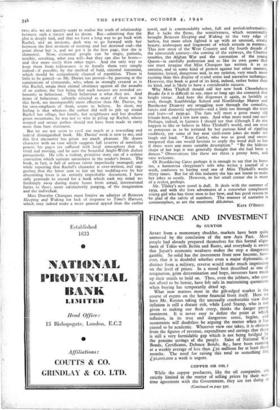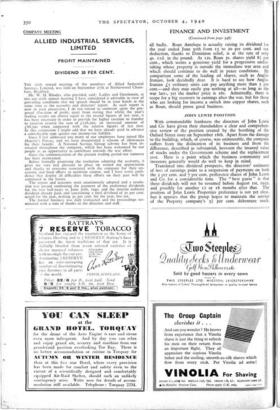FINANCE AND INVESTMENT
By CUSTOS
APART from a momentary shudder, markets have been quite unmoved by the conclusion of the new Axis Pact. Most people had already prepared themselves for this formal align- ment of Tokio with Berlin and Rome, and everybody is aware that Japan's economic weakness makes the step a dangerous gamble. So solid has the investment front now become, how- ever, that it is doubtful whether even a major diplomatic, as distinct from a military, reverse would make much impression on the level of prices. In a mood best described as one of resignation, grim determination and hope, investors have made up their minds to hold on. Thus, even the jobbers, who can- not afford to be heroic, have felt safe in maintaining quotations when buying has temporarily dried up. What now matters most in the gilt-edged market is the course of events on the home financial front itself. Here we have Mr. Keynes taking the unusually comfortable view that inflation is still a distant risk, while Lord Stamp, who is not given to making our flesh creep, thinks the danger pretty imminent. It is never easy to define the point at which inflation, in its true and dangerous sense, begins, and economists will doubtless be arguing the matter when it has ceased to be academic. Whatever view one takes, it is obvious from the figures c'f revenue, expenditure and savings that there is still a very formidable gap which is not being bridged by the genuine savings of the people. Sales of National War Bonds, Certificates, Defence Bonds, &c., have been running at a weekly average of less than £20 milliom for at least three months. The need for raising this total to something like £30,000,000 a week is urgent.
COPPER OR OIL ?
While the copper producers, like the oil companies, are strictly limited in the matter of selling prices by their war- time agreement with the Government, they are not doing at (Continued on page 356; FINANCE AND INVESTMENT
(Continued from page 348)
all badly. Roan Antelope is actually raising its dividend for the year ended June 30th from 15 to 20 per cent. and tax deduction, thanks to Dominion relief, is at the rate of only 4s. I id. in the pound. At its. Roan 5s. shares yield 81 per cent., which seems a generous yield for a progressive under- taking whose property is outside the immediate war area and which should continue to do well in peace conditions. By comparison some of the leading oil shares, such as Anglo- Iranian, look decidedly dear. It is hard to see how Anglo- Iranian Li ordinary units can pay anything more than 5 per cent.—and they may easily pay nothing at all—as long as the war lasts, yet the market price is 26s. Admittedly, there is scope for a big recovery in earnings after the war, but for those who are looking for income a switch into copper shares, such as Roan, should prove good business.
JOHN LEWIS POSITION
With commendable frankness the directors of John Lewis and Co. have given their shareholders a clear and comprehen- sive review of the position created by the bombing of the Oxford Street store on September 18th. Apart from the damage to the building, which, of course, was uninsurable, the company suffers from the dislocation of its business and from the difference, described as substantial, between the insured value of stocks under the Government scheme and the replicement cost. Here is a point which the business community and investors generally would do well to keep in mind.
Translated into dividend prospects, the directors' estimates of lost of earnings point to a suspension of payments on both the 5 per cent. and 7 per cent. preference shares of John Lewis and Co. for a considerable time. The " best guess " is that these dividends will not be resumed before August 1st, 1942, and possibly for another 12 or 18 months after that. The position of John Lewis Properties preference is not yet clear, but it appears that the group hopes to maintain the service of the Property company's 31 per cent. debenture stock.



























 Previous page
Previous page